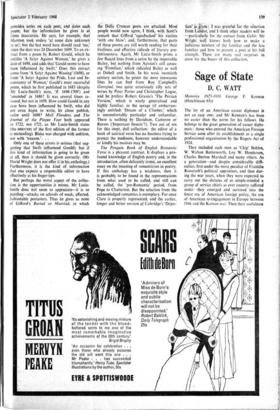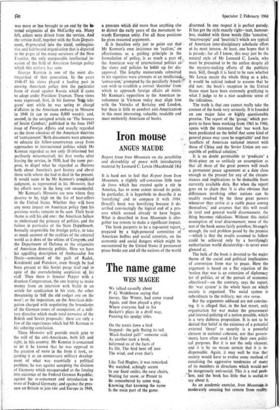Sage of State
D. C. WATT
Memoirs 1925-1950 George F. Kennan (Hutchinson 65s) The lot of an American career diplomat ia not an easy one; and Mr Kennan's has been no easier than the norm for his fellows. He belongs to the great generation of career diplo- mats: those who entered the American Foreign Service soon after its establishment as a single professional organisation by the Rogers Act of 1924.
They included such men as 'Chip' Bohlen, W. Walton Butterworth, Loy W. Henderson, Charles Burton Marshall and many others. As a generation—and despite considerable diffi- culties, first under the more peculiar of Franklin Roosevelt's political appointees, and then dur- ing the war years, when they were expected to carry out the dictates of as simple-minded a group of service chiefs as ever country suffered under—they emerged and survived into the finest era of American foreign policy, the era of American re-engagement in Europe between 1946 and the Korean war. Then their usefulness was more or less brought to an end by the tenni exigencies of the McCarthy era. Many left, others were driven from the service. And the service itself, together with the State pepart- ment, degenerated into the timid, uth'*agina- five and hidebound organisation that is depicted in the pages of the many survivors of the New Frontier, the only comparable intellectual in- vasion of the field of American foreign policy which this century has seen.
George Kennan is one of the Most dis- tinguished of that generation. In the years 1946-47 his views played a leading part in moving American policy into the particular form of stand against Russia whicff-'d came to adopt under President Truman. These views were expressed, first, in his famous `to,tg- tele- gram' sent while he was acting fiS charge d'affaires in the American embassy in Moscow in 1946 (it ran to some 8,000 words); and, second, in the unsigned article on `The Sources of Soviet Conduct,' published in the June 1947 issue of Foreign Affairs and usually regarded as the locus classicus of the American doctrine of 'containment.' Both documents were attempts to educate his fellow-countrymen away from approaches to international politics which Mr Kennan regarded as not only ill-informed but perilously misconceived; his first works after leaving the service, in 1950, had the same pur- pose, to dispel what he regarded as illusions both about America's past history and about those with whom she had to deal in the present. It would seem to be Mr Kennan's considered judgment, as represented in his Memoirs, that his efforts were in the long run unsuccessful.
Mr Kennan's Memoirs are now where they deserve to be, high on the list of best-sellers in the United States. Whether they will, have any more impact on American policy tip his previous works remains to be seen. Their basic theme is still his old one: the American failure to understand the primacy of politics, and the failure in particular of the State Depaitmerrt, formally responsible for foreign policy, to take as much account of the realities of the external world as it does of the whims of Congreini and the Department of Defense or the exigencies of American domestic politics. Here we have his appalling description of Ambassador Joe Davis—convinced of the guilt of Radek, Kreshinski and Piatokov, even though he had teen present at this Soviet purge trial 'and in spite of the overwhelming scepticism alt his staff. Then there is Senator Pepper with a drunken Congressman, the one hoping to make money from an interview with Stalin in an article for syndication in his state, the other threatening to `buff the old codger one on the nose'; or the imposition, on the American dele- gation charged with negotiating the boundaries of the German zones of occupation, of a mili- tary directive which made total nonsense of the British and Soviet proposals: these are only a few of the experiences which led Mr Kennan to his sobering conclusion.
These Memoirs will provide much grist to the mill of the anti-Americans, both left and right, in this country. Mr Kennan is concerned to let it be known that he was opposed to the creation of NKr() in the form it took, re- garding it as an unnecessary military develop- ment of what was essentially a political problem; he was against accepting the division of Germany which masqueraded as the forcing into existence of the Federal German Republic; against the re-armament and introduction to NATO of Federal Germany; and against the pres- sure on Britain to join EDC and Europe in 1949, a pressure which did more than anything else to distort the early years of the movement to- wards European unity. For all these positions he gives reasoned arguments.
It is therefore only just to point out that Mr Kennan's own insistence on 'realism,' on effectiveness as a guiding principle in the formulation of policy, is as much a part of..,x the American way of international politics aslt.' the views and policies he holds up for dis- approval. The lengthy memoranda submitted to his superiors were attempts at an intellectual,,,.. `conversion,' prompted by the peculiarly Ameri-iir can wish to establish a correct 'doctrine' from ' which to approach foreign affairs ab initio. Mr Kennan's opposition to the American in- volvement in Vietnam today may align him with the Vietniks of Berkeley and London, but there is little to comfort anti-Americanism in this most interesting, valuable, readable and most eminently American of books.



































 Previous page
Previous page